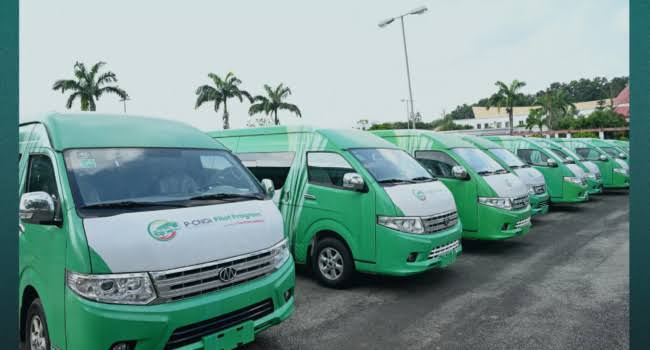The recent announcement by the Malaysian government to phase out the use of natural gas for vehicles by July 2025 has sparked reactions from Nigerians, given the Nigerian government’s ongoing push to promote Compressed Natural Gas (CNG) as an alternative to petrol.
The Malaysian Transport Minister, Anthony Loke, recently stated that the decision was made to prioritise the safety of road users and the public, according to Malaysia Reserve.
Loke reportedly cited the potential hazards posed by ageing CNG tanks nearing the end of their safe usage life.
Speaking at a press conference on Monday, Loke was quoted as saying, “These NGV tanks have a safe usage lifespan of approximately 15 years, and if they are not replaced, they become unsafe to use and may fail at any time.”
The phase-out will reportedly impact 44,383 active NGV vehicles in Malaysia, including taxis, private vehicles, buses, and machinery, which make up 0.2% of the nation’s registered motor vehicles.
The report added that the government-owned oil and gas company, Petroliam Nasional Berhad, will halt the sale of CNG at its stations in stages from 1 July.
The minister was also said to have announced a set of assistance programmes for NGV-powered taxi drivers, dual-fuel vehicle owners, and owners of purely NGV-powered vehicles.
In contrast, the Nigerian government, led by President Bola Tinubu, has been promoting CNG vehicles as a safer and more cost-effective alternative to petrol.
In August 2023, Tinubu approved the establishment of the Presidential Compressed Natural Gas initiative to ease the impacts of fuel subsidy removal on citizens.
The initiative also announced on Wednesday that it has converted over 100,000 vehicles to CNG or bi-fuel configurations.
However, Nigerians have expressed concerns over the safety of CNG vehicles following recent explosions involving some converted vehicles.
Many have also taken to social media to question the safety of adopting CNG vehicles, citing Malaysia’s decision to phase them out.
Ini Ekott, tweeting on X.com as #iniekott, wrote on Thursday, “Meanwhile, Nigerian rulers are putting CNG forward as a safe alternative to petrol.
Note the clear-headed and tangible provisions made by the Malaysian government to help citizens with the transition.”
#Otunbakush1 wrote, “And here is Nigeria saying people should convert to CNG… Death Race.”
#PaschalNwosu5 commented, “Malaysia introduced CNG in the 1990s; now they are stopping it in 2024, while Bola and his supporters are asking Nigerians to change to CNG. APC is taking you 34 years backwards, but some of you’re defending it.”
#SmartAtuadi similarly wrote, “Yet, here in Nigeria, they want to decimate the population by their tacit promotion and coercive campaign for Nigerians to convert their vehicles to CNG.”
#Oserume1 commented, “If CNG was a good idea, Tinubu would have converted his official luxury Cadillac Escalade from petrol to CNG!”
#PastorGreatKing wrote, “Basically, President Tinubu is telling Nigerians to buy CNG as a way of diverting our attention from constant fuel price increases. When cars start blowing up like missiles, we all run back to fuel, but then it’s too late to argue/protest about fuel prices.”
Presidency Alley Concerns Of CNG Vehicles
Meanwhile, the Presidency has sought to allay concerns regarding the safety of Compressed Natural Gas (CGN)-powered vehicles, recently introduced in Nigeria as an alternative to fuel-powered cars.
The Special Adviser to President Bola Tinubu on Information and Strategy, Bayo Onanuga, dismissed these fears in a post on X on Thursday while responding to reports on Malaysia’s plan to phase out CNG-powered vehicles by 2025.
PUNCH Online earlier reported that the Malaysian government announced plans to phase out CNG vehicles and end the sale of natural gas vehicles by July 2025.
According to local media source Free Malaysia Today, Malaysia’s Minister of Transport, Anthony Loke, made this announcement at a press conference on Monday. He explained that the decision was intended to protect road users and the public from the potential hazards posed by ageing CNG tanks.
Loke was quoted as saying, “These NGV tanks have a safe usage lifespan of approximately 15 years, and if they are not replaced, they become unsafe to use and may fail at any time.” From July 1, 2025, CNG-powered vehicles will no longer be registered or allowed to operate in Malaysia.
However, Onanuga clarified that Malaysia’s policy was focused on the safety of Liquefied Petroleum Gas (LPG), not CNG.
He added that Nigeria chose CNG specifically for its safety and cost-effectiveness, with plans underway to develop domestic tank manufacturing capacity.
Onanuga wrote, “Some clarification on Malaysia’s plan to phase out CNG-powered vehicles:
“The Malaysian issue relates to the safety of LPG, NOT CNG. In the original report, Transport Minister Anthony Loke stated, ‘There are also some car owners who have modified their vehicles using liquefied petroleum gas (LPG) cylinders, which are very dangerous.’
“NGV covers both CNG and LPG. Nigeria, in its transition, has adopted CNG ONLY, not both, due to valid safety and cost concerns regarding LPG.”
Onanuga further noted, “Malaysia’s programme for CNG-powered vehicles struggled, achieving only a 0.2% conversion rate over 15 years. By contrast, nations like India, China, Iran, and Egypt have seen considerable success.”
He added that Malaysia faced difficulties in replacing 15-year-old tanks due to limited manufacturing capacity, while Nigeria, in its first year of adopting CNG, is already addressing this.
Malaysia introduced CNG for taxis and airport limousines in the late 1990s, while Nigeria began its own CNG initiative in 2024 as an alternative transportation fuel.
PUNCH











